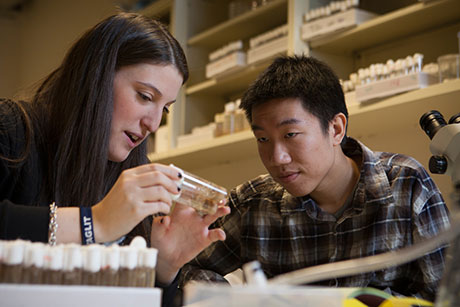Upperclass students connect undergrads to research
By Kathy Hovis

Whether they’re studying the science of Earth systems or sociology, many Cornell undergrads want the opportunity to conduct research as part of a professor’s team before they graduate.
But finding the right opportunity and learning what it’s like to be an undergrad researcher can be a tough road to navigate, especially for a first-year student who’s faced with a million possibilities and still unsure of her major.
Students on the Cornell Undergraduate Research Board (CURB) realized the problem several years ago and started a peer mentorship program to connect experienced student researchers with new students. Last year, the program served 100 mentees with about 20 mentors. They are in the process of recruiting mentors and mentees. The deadline to apply is Friday, Feb. 6.
“We have meetings once a month and offer presentations from professors about how they got involved in research and what they look for in undergraduate researchers,” said Ashley Odai-Afotey ’15, a biology major in the College of Arts and Sciences researching cancer biology. The program also hosts lab tours across campus, offers workshops on best practices to contact professors, interviewing, writing emails, finding research opportunities and exploring careers in research, and match older students with three to five student mentees who share their research and academic interests.
Odai-Afotey is a co-chair of CURB’s peer mentorship program, along with Gi Hye Im ’15, also a biology major in the College of Arts and Sciences. Melanie MacMullan ’16, a biomedical engineering major in the College of Engineering, is the group’s events coordinator.
“One of the biggest problems that freshmen and sophomores face when searching for research is discouragement,” said Sydney Gehrking ’15, a mentor majoring in biological sciences and Asian studies. “Finding the right lab can be a challenging endeavor, but the peer mentorship program provides a support network for students. Whether proof-reading emails they draft, suggesting other departments for them to explore based on their interests or simply being someone to talk to, the mentors and members of the mentorship program are here for them.” Gehrking works in a lab studying physiological causes of reduced blood flow in the brains of Alzheimer's disease patients.
Christopher Chang ’18 said undergrad research helps students explore possible careers. “But I also think it's a good way to get involved with issues that are important to you,” said Chang, who works in the lab of professor Laura Harrington, studying reproductive behavior of mosquitos. “I'm interested in the intersection between biology and the environment, for example, and I liked that the Harrington lab's research had ties to both ecology and a really important, contemporary global human health issue (mosquito-borne diseases).”
“The mentorship program has given me the chance to meet fellow undergraduates and help them through something I have already done – research emails, lab tours and starting a lab,” said Eliana Jacobson ’16, an environmental science and sustainability major in the College of Agriculture and Life Sciences who is Chang’s mentor. “Because CURB matches us not only based on what research we are in or want to go into but also our general interests and major, I have found a real friend in Christopher. I’ve been able to give him advice on course selection and finding the right academic adviser and he has become a role model for me in his passion, perseverance and dedication.”
For more information and to apply to be a mentor or mentee, visit the CURB Peer Mentorship website.
Kathy Hovis is a staff writer for the College of Arts and Sciences.
Media Contact
Get Cornell news delivered right to your inbox.
Subscribe